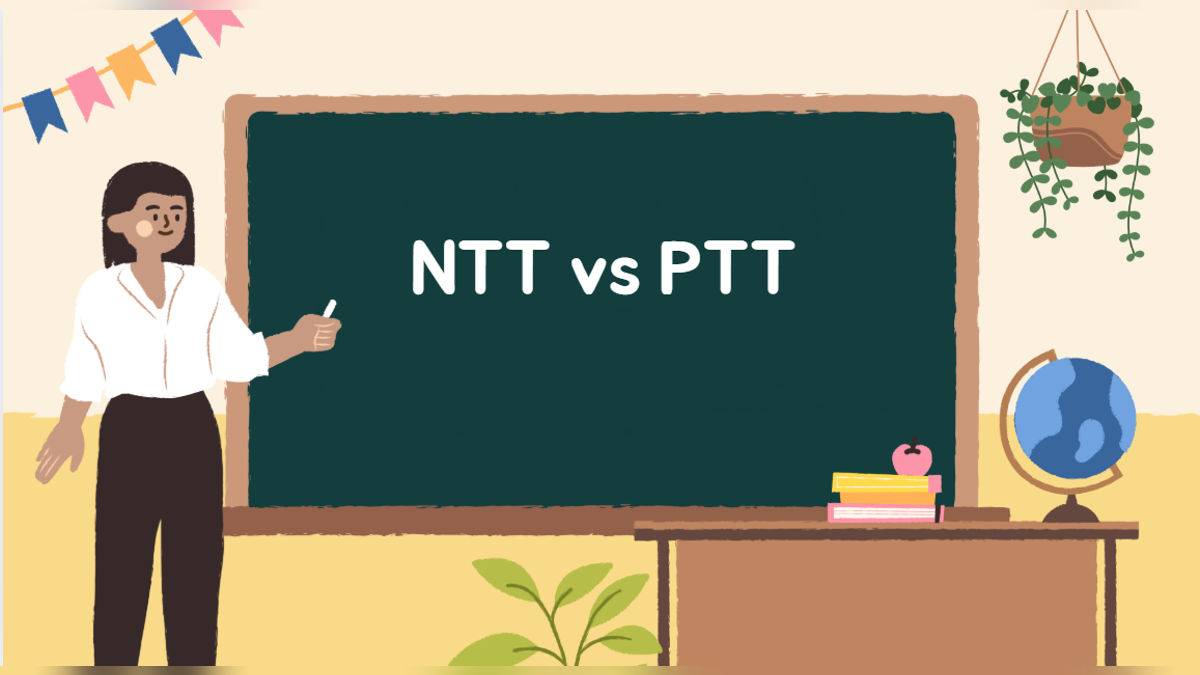Difference Between NTT and PTT
This detailed comparison of NTT and PTT will help you decide which course suits your career goals best.
Teaching is one of most respected professions in India. There are many courses like NTT (Nursery Teacher Training) and PTT (Primary Teacher Training) prepare aspiring educators to teach at different academic levels. Many candidates are often confused about difference between NTT and PTT and which one is more suitable for them.
Also Read: Top 10 Teacher-Training Courses in India
- What is NTT?
- What is PTT?
- Difference Between NTT and PTT
- Entrance Exams for NTT and PTT Courses
- Top Colleges Offering NTT and PTT Courses in India
- NTT or PTT - Which is Better?
- Career Scope After NTT and PTT
What is NTT?
The NTT course emphasizes nurturing the emotional, social, and intellectual growth of young children through play-based learning and creative teaching methods.
Also Check: What is NTT: Full Form, Course Duration, Admission 2025, Colleges, Syllabus, Salary & Scope
No, NEET is national-level exam with high competition.
The fees for every RIE is almost same costing around ₹26,000 to ₹40,000 for the complete program.
What is PTT?
PTT trains teachers to educate students from grades 1 to 5. Candidates get the skills needed to handle young learners transitioning from preschool to formal education.
-
Full Form: Primary Teacher Training
-
Duration: 1 to 2 years
-
Eligibility: 10+2 pass with at least 50% marks (some institutes may prefer graduates)
-
Focus Areas: Child pedagogy, educational psychology, curriculum planning, and classroom management
-
Career Scope: Primary school teacher, academic coordinator, or education counselor
Also Check: What is PTT: Full Form, Course Duration, Admission 2025, Colleges, Syllabus, Salary & Scope

Difference Between NTT and PTT
| Parameter | NTT | PTT |
|---|---|---|
| Focus | Early childhood care and development | Foundational academic learning |
| Teaching Methods | Play-based, activity-oriented | Subject-based, structured learning |
| Career Opportunities | Nursery, preschools, Montessori institutions | Primary, elementary education centers |
| Salary Range (Approx.) | ₹2–4 LPA | ₹3–5 LPA |
Entrance Exams for NTT and PTT Courses
| Exam Name | Conducting Body |
|---|---|
| IGNOU BEd Entrance Exam | Indira Gandhi National Open University |
| SCERT Delhi NTT/DIET Admission | State Council of Educational Research and Training (Delhi) |
| Uttar Pradesh BTC (DElEd) | UP Pariksha Niyamak Pradhikari |
| Haryana DElEd Admission | SCERT Haryana |
| Rajasthan NTT Entrance Exam | State-approved colleges |
Check These Courses
Top Colleges Offering NTT and PTT Courses in India
| College / Institute Name | Courses Offered |
|---|---|
| Foundation NTT | NTT, PTT, Montessori |
| Mahatma Gandhi College of Education (MGCE) | NTT, PTT, BEd |
| Delhi Polytechnic College | NTT, PTT |
| NIECCE (National Institute of Early Child Care & Education) | NTT, PTT, Montessori |
| Samruddhi Academy | NTT, PTT |
| Regional Institute of Teacher Training | NTT |
Also Check: DEd Colleges in Haryana
NTT or PTT - Which is Better?
The choice between NTT and PTT depends on your interest and the age group you prefer to teach:
-
NTT candidates work with young children and focus on early childhood development.
-
PTT is responsible for primary school students in formal school environments.
The Primary Teacher Training course may provide better job opportunities in government and private schools.
Career Scope After NTT and PTT
Candidates can explore several career opportunities.
| Course | Possible Job Roles |
|---|---|
| NTT | Nursery teacher, Montessori instructor, preschool manager, child development assistant |
| PTT | Primary teacher, academic coordinator, subject teacher, curriculum designer |
Also Read

Anshul Jindal completed her Masters in Computer Applications from JIMS, Delhi, and has over 4 years of experience in content writing. Currently at Shiksa, creating content for exams like AILET, MHCET Law, and NLET.
Read Full Bio Call 8585951111
Call 8585951111

The best depends on the location mainly. The top universities include